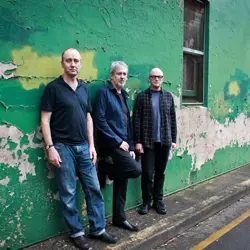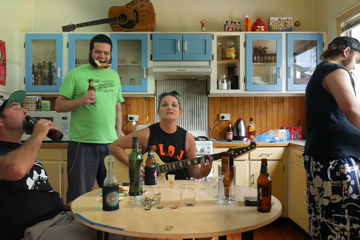 The Necks
The NecksIf things had gone to plan, you might never have heard The Necks at all. Already with growing reputations in both jazz and pop worlds, keyboardist Chris Abrahams, drummer Tony Buck and bass player Lloyd Swanton were young guns looking for new musical challenges as the 1980s began to wind down.
“It was meant as just an experiment between the three of us and the four walls of the room we were rehearsing in,” explains Swanton. “And one thing we were absolutely adamant about was we'd never play in public. We just wanted to nurture the music.”
But they ended up with a change of collective mind. “We just thought it would take months to develop anything, but started getting wonderful results really quickly. And then made that big call to actually attempt it in front of an audience.”
To consider recording took even longer to reconcile. The bass-playing element reveals the thought process: “It didn't feel comfortable recording until a long time after that. Again, we were just worried of making something like that frozen in time – when the nature of improvisation is it being 'of the moment'. It's made – and then it disappears.
Don't miss a beat with our FREE daily newsletter
“That first live album – Piano Bass Drums – we were happy with it, but didn't want people to think, 'Well, that's what The Necks do'. It's an evolution. That finding something new and different is what keeps it interesting, absolutely. We have the basic framework, but the results are very, very different from what we were getting twenty years ago.”
He adds a good-humoured afterthought. “It's actually odd to process it like that. We started around 1987. It's quite sobering to realise I've been in The Necks for over half my life, give or take.”
Whatever the secret of The Necks' music – described with terms like 'long-', 'trance-', 'slow-', or 'post-' in front of the word jazz, as well as the improvised tag – their international reputation and demand keeps growing. Swanton accepts: “There's no one label for it. Does it sound immodest if I say we are unique? No one pigeonhole fits. All have an element of truth, but none tell the whole story.”
This demand has them touring for the next couple of months, across Australia playing places ranging from pub venues, to arts complexes, to the Sydney Opera House's Opera Theatre. Then heading to Japan as guests of the Jim O'Rourke-curated I'll Be Your Mirror, a new series of artist curated music, film and art events acting as sister events to the All Tomorrow's Parties Festival.
It's not their first time at the Opera House, but there is a difference. “We've played in the Studio there and in the Concert Hall with Brian Eno,” he adds matter-of-factly. “But this is our first time on the Opera Theatre stage. We did Back To Back– a theatre show – there, but we were in the orchestra pit. It's a big room, bit somehow remains intimate – and it's a lovely sounding place for us. We're most chuffed to be playing there. It still has that sense of event whenever you play at the Opera House.”
With a music so hard to place, is there a 'right' place for The Necks to play? Swanton ponders his answer: “I think we can adapt to a variety of contexts. We have preferences; playing outdoors is probably our least favourite. You simply don't get the harmonics reverberating as you do in whatever size room.
“Ideally, probably best is playing in like a 200 to 300 seat room, for two or three nights in a row. It gets a momentum to it. But there's not even a rule there – sometimes the first night is as good as it gets, others you can develop things to ends you didn't even imagine the first time.”
He then makes it sound annoyingly simple: “We just walk out and start playing. That's the one rule that hasn't changed. That someone will have an idea and just start it off. No, there's no 'rock, paper, scissors' to decide who begins – it's whoever has an idea.”
The way the music unfurls so liquidly had some suggesting there was something akin to a telepathy between the trio. Is it that, or just three good musicians knowing what they're doing? “More probably the latter,” Swanton chuckles. “If you play together for this long, you can't help but knowing what one does will probably cause a certain reaction and what that might trigger in one of the others. But that's the thing. That balancing act – thinking you know which way something may go – and that little edge of excitement that you can never be entirely inside someone else's head.”
So, has it ever fallen over? “Oh yeah, there are pieces we've done over the years that we might say have had 'a difficult labour',” he muses. “But maybe only four or five times over the years we've walked offstage going, 'Oh, that was a bit bizarre'.
“But one thing I've learnt as a musician – not just in The Necks – is you can think you've had a mediocre show, but someone will come up and just tell you, 'Wow! That music changed my life tonight.' Or nights you think you're God's gift to music and people go, 'Er, yeah – well, that was a bit ordinary'.”
Lesson learnt: “Just don't get too hung up on one performance, 'cause it will hopefully be better, worse, just different the next night.”
Even after these 25 years and the range of credits even beyond The Necks the members now have, you get the feeling they still an element of adventure and joy in it for them. “Oh, totally,” Swanton emphasises. “The Necks remains one of the things I most look forward to in my musical life. Equally, we also know not to push it too far or try and make it something it's not.
“But I think we'd know when we've wrung it out. And then we'd pull up stumps completely, or maybe just revert to being just those three guys in a room again.
“We've always had other things to explore musically. And Tony now living in Berlin factors into it; it becomes an occasion when we are together. That distance, those times apart















